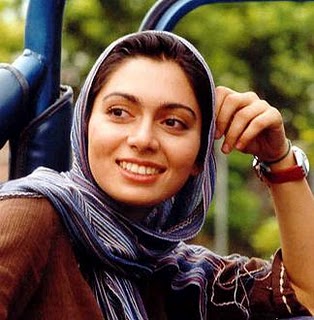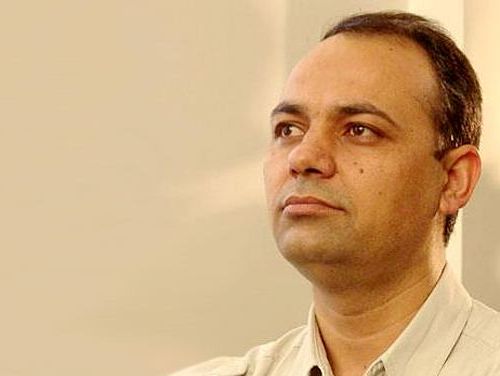 In a joint letter addressed to Ayatollah Larijani (left) organisations draw their attention to the detention of film maker Mahnaz Mohammadi, and actress and documentary maker Pegah Ahangarani.
In a joint letter addressed to Ayatollah Larijani (left) organisations draw their attention to the detention of film maker Mahnaz Mohammadi, and actress and documentary maker Pegah Ahangarani.
„We are concerned that they are detained without charge, without access to a lawyer and, where required, without the necessary medical treatment. We ask you to release them immediately.
Their arrests increase the growing number of artists, journalists and human rights activists currently in prison in Iran, a country that is currently consolidating its reputation as the leading jailer of journalists in the world, along with China.
We would like to remind you of Iran’s obligations under international law. Iran is a signatory to the International Covenant on Civil and Political Rights which recognises the right to freedom of expression and states that no one shall be subjected to arbitrary arrest or detention. We ask you to honour Iran’s commitments and to release all prisoners of conscience who are unjustly detained“, says the letter.
Detained women filmmakers
Mahnaz Mohammadi, a renowned filmmaker whose work includes a banned documentary on women’s rights in Iran, was arrested by anonymous security officials at her home in Tehran on June 26 2011. She is detained in Evin prison, where many activists and artists are currently held.
Mohammadi’s lawyer told UK newspaper the Guardian that she has been denied access to her family and to legal representation, and that she has a critical health condition which requires medical attention. Mohammadi was also arrested in August 2009 at Tehran’s main cemetery for protesting against the unlawful killing of Neda Agha Soltan, the activist whose death during the post-election protests was caught on video and disseminated widely on the internet.
Actress and film-maker Pegah A hangarani (right) was arrested as she tried to leave the country to travel to Germany for the Women’s World Cup. The exact date and time of her arrest are unclear but the BBC Persian language service reports that the news of her arrest surfaced on the 13th of July. Ahangarani produced a documentary called ‘Deh Namaki Ha’ in which she criticises the propaganda style of film-making of the Iranian militia, widely known as the Basij.
hangarani (right) was arrested as she tried to leave the country to travel to Germany for the Women’s World Cup. The exact date and time of her arrest are unclear but the BBC Persian language service reports that the news of her arrest surfaced on the 13th of July. Ahangarani produced a documentary called ‘Deh Namaki Ha’ in which she criticises the propaganda style of film-making of the Iranian militia, widely known as the Basij.
Mohammadi and Ahangarani are among a group of women artists and activists currently in detention. Other prominent figures include photographer Maryam Majd, journalist Zahra Yazdani, women’s rights advocate Maryam Bahrman and activist Mansoureh Behkish.
Detained journalists
The Committee to Protect Journalists (CPJ) expressed its disturbance on 8 July by the Iranian government’s persistent mistreatment of detained journalists as well as news reports that authorities have arrested two additional journalists in recent days.
Hossein Ronaghi Maleki, the 26-year-old blogger who is currently serving the second year of a politicized 15-year prison sentence, developed kidney disease while in prison and has been suffering from related complications at least since April 2010, according to news reports.
Ronaghi Maleki’s father told the U.S.-funded Radio Farda that his son is under sustained physical and psychological pressure “to confess” on television to crimes he has not committed. Ronaghi Maleki’s father also said that his son’s 376 days in solitary confinement led to his kidney complications.
The journalist, who was arrested in December 2009, discussed politics in a series of critical blogs that were blocked by the government. He was also a founder of an anticensorship group known as the Iran Proxy, which was launched in 2003. After 10 months in “temporary detention,” he was sentenced to 15 years in prison on charges of “membership in the Internet group ‘Iran Proxy’, and propagating against the regime,” “insulting the Supreme Leader,” and “insulting the President.” An appeals court upheld his sentence.
Ronaghi Maleki was transferred to hospital in March and then again in May, where he underwent a kidney transplant. He was back in prison within 14 days, according to reformist news websites. Ahmad Maleki, th e blogger’s father, told an opposition website that he petitioned authorities for medical furlough, but interrogators would not approve the leave.
e blogger’s father, told an opposition website that he petitioned authorities for medical furlough, but interrogators would not approve the leave.
Zaid-Abadi (left) was arrested on 14 June, 2009. In November 2009, he was sentenced to six years in prison, five years’ exile to Gonabad in Khorasan Province, and a “lifetime deprivation of any political activity” including “interviews, speech, and analysis of events, whether in written or oral form,” CPJ research shows. An appeals court upheld the sentence on January 2, 2010, according to Advar News. Zaid-Abadi won the UNESCO/Guillermo Cano World Press Freedom Prize 2011.
Two journalists have also been detained in recent weeks in separate incidents.
Photojournalist Maryam Majd was arrested on June 17, one night before she was scheduled to travel to Germany to cover the Women’s World Cup. Her hosts in Germany reported her disappearance when she did not arrive on the flight they were expecting, Deutsche Welle reported. Iranian judicial authorities refuse to explain why the journalist was detained. Majd is reportedly being held in solitary confinement at Evin Prison.
As of CPJ’s last annual census, on December1, 2010, Iran was the world’s leading jailer of journalists, tied with China, with 34 in prison. Iran continues to be among the world’s worst jailers of journalists.
Related articles:
Iran: journalist arrested, fears for safety and freedom of expression
Iranian film director sentenced to 6 years in prison and banned from making films for 20 years
Iran: one year after elections – importance of internet and small media
Take action to free Iranian blogger
Free speech organisations call Iran to release blogger Hossein Derakhshan
Iranian journalist sentenced to six years’ imprisonment





